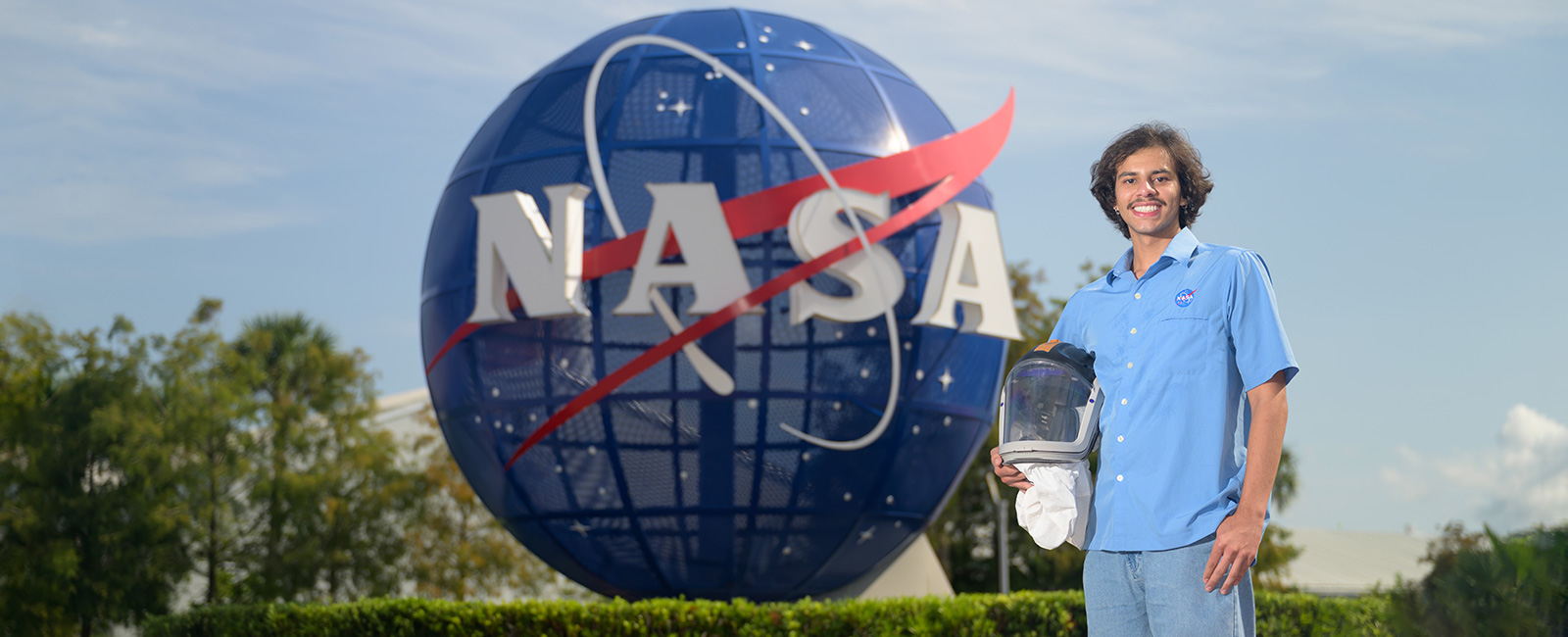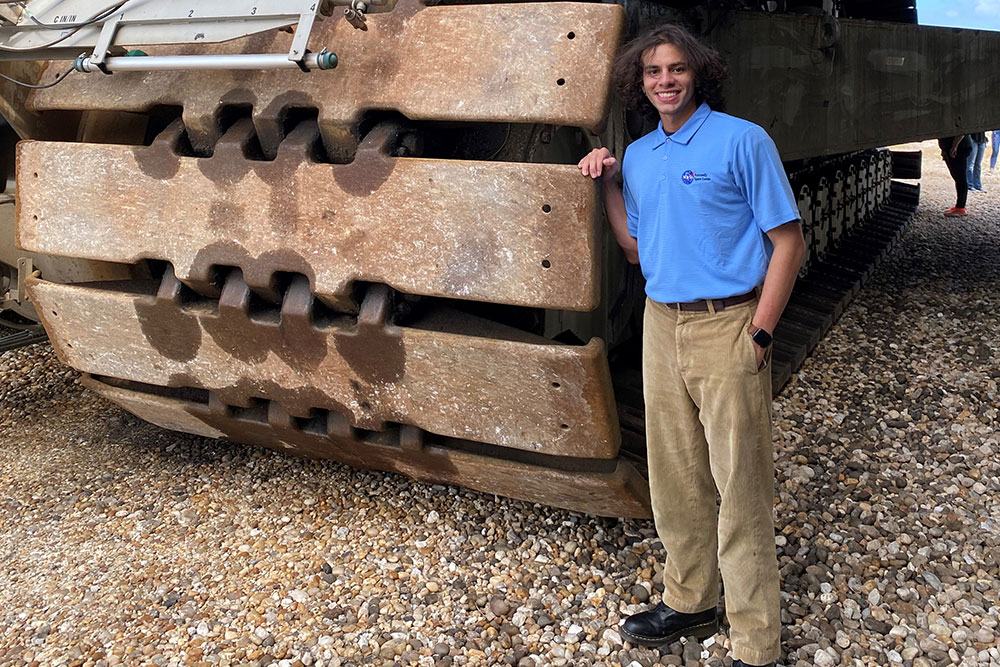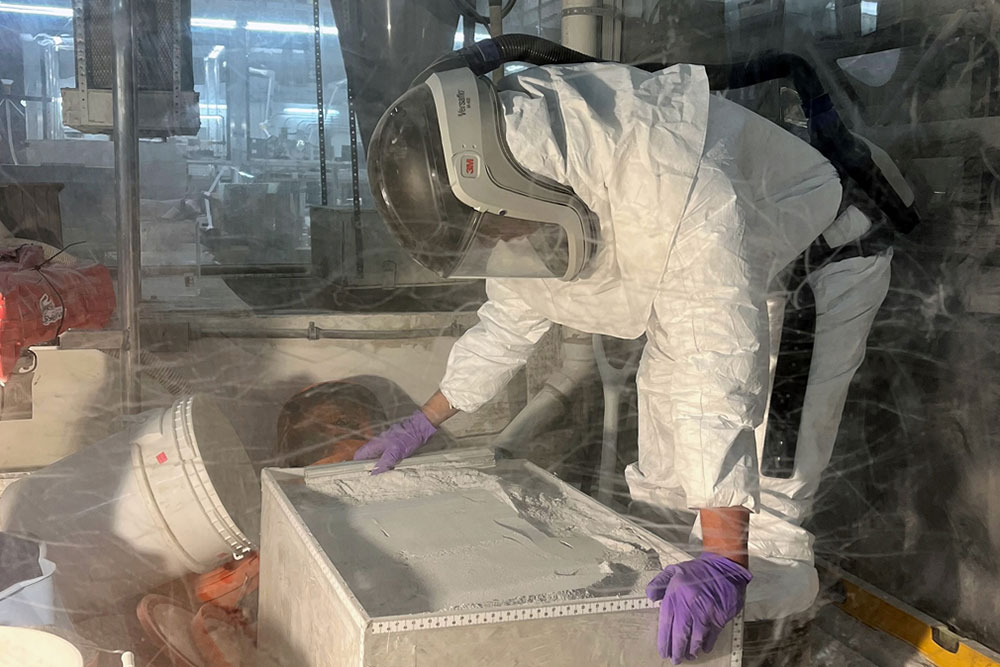Eduardo Bidot

Aiming for the stars
Eduardo Bidot struggled with ADD, but returned to Valencia College to pursue his dream of working at NASA
— by Becca Bides
When he was a young boy, Eduardo Bidot’s dream of working for NASA was sparked when he saw a movie at a planetarium on twin Mars rovers named “Spirit” and “Opportunity.”
Originally planned as a three-month mission, the plucky rovers far outlasted NASA’s expectations, with a prolonged life exploring Mars. After six years, Spirit got stuck in the soft soil and lost power, leaving Opportunity alone on the planet. (Opportunity continued solo for another eight years until it was blanketed in a planet-wide dust storm.)
“I couldn’t stop thinking about how the rover was left in space, all alone. I didn’t want it to be alone. I wanted to make another rover to send to it, so it would have a friend. I tried for years to build one from Legos,” recalls Eduardo.

Eduardo Bidot poses at the base of one of NASA’s crawler-transporters, which transport rockets from the Vehicle Assembly Building to the Kennedy Space Center's launch pads.
As he grew into a teen, his Legos and NASA dreams were boxed up and discarded. Wrestling with undiagnosed Attention Deficit Disorder, he struggled to graduate from high school.
“I didn’t talk with my parents about college, didn’t take education seriously and didn’t have the skills to organize myself,” he said. “My sense of the future wasn’t a plan; it was really about just tomorrow.”
He enrolled in Valencia College for one semester, but failed every class and dropped out. When he started working as a pharmacy technician, he had a revelation.
“I had a colleague who complained daily that she hated her job, yet she’d been working at that company for 30 years with no plans to change,” he says. “I suddenly realized that if I kept living my own life just day-by-day, I could wind up the same way. I recognized then that I wanted a career I was passionate about.”
He returned to Valencia College to pursue his A.A. again, determined but nervous.
“I was really, really scared that I’d be in class with younger people who had already figured out their lives. It’s easy to compare yourself to them, but it ended up the best decision I’ve ever made,” says Eduardo, who’s now 23. “My teachers were passionate about their subjects and cared enough to give me one-on-one attention.”
He was particularly intimidated to take the STEM classes because he had failed several in high school.
“Subjects that I thought were impossible for me to learn, like algebra and chemistry, were brought to life by my Valencia teachers.”
He credits his turning point to these teachers, such as his Intro to General Chemistry professor.
“I was worried because I had failed chemistry in high school. But the amount of care she had for each individual student and her patience amazed me. Her lectures also were truly next level. You could tell she was teaching out of passion for the subject. She made me proud to be part of Valencia.”
Other professors also took an interest in his education, including an American Sign Language teacher who helped him with coping skills for his ADD, algebra professor Melissa Serbert who continually checked-in with each student to assess their understanding, and Joel Berman, Stefan Bidigaray and Victor Bondzie, who each encouraged him and accommodated his work schedule.

Eduardo Bidot gathers data on simulated lunar materials in the Kennedy Space Center Granular Mechanics and Regolith Operations lab.
As Eduardo developed the tools to succeed in a future career, his childhood dream to work at NASA began to take shape.
When he saw Valencia College promoting NASA’s Community College Aerospace Scholars program, he applied for an internship and landed it. Because of his passion and hard work, he was asked to stay on for more internships – and is currently in his fourth internship with NASA.
The focus of these internships? To manage and study the impact of lunar dust, a huge problem in space exploration - and the substance that ended the mission of the two rovers from his boyhood dreams, Spirit and Opportunity.
Through these NASA internships, Eduardo has designed air cannons to test the impact of rocket engines on lunar dust, developed operations for a robotic arm that can mine and excavate on the moon, and is currently developing components for a rover named Rassor that may one day be able to compact soil on planets so that we can build there.
When asked what he’d like to share with others about his educational journey, Eduardo demonstrates the spirit of compassion he had for the lone Mars rover left behind: that no one feels alone.
“The biggest thing I want to put out there is to be mindful that everyone has their own path in life. My condition set me on a path to be here and I am grateful for that,” he says. “People always ask how someone who struggled in high school can be doing such a hard major. First, if you don’t want to do something, it will seem impossible, so I started with something I loved. Second, I had teachers who reached out to me and really made a difference.”
He also credits his success to the determined spirit he inherited from his mother.
"I'm grateful for having such a strong mother, who raised me as a single mom but still always gave me the best of herself that she could. As much as I have accomplished, I still don't think I'd be able to do half the things she did, while she also was raising me at the same time."
After graduating from Valencia College with his A.A. in spring 2024, Eduardo is studying for a bachelor’s degree in Aerospace Engineering at the University of Central Florida.
We have no doubt that Eduardo’s future career, forged through spirit and opportunity, will be written in the stars.
At Valencia College, we work every day to create a level playing field for college students of all backgrounds, fashioning a college where every student can succeed. And our students continue to amaze and surprise us. Read more of their stories.